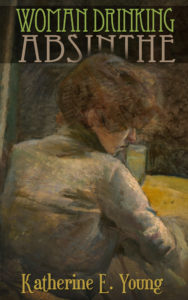 Review by Lisa C. Taylor
Review by Lisa C. Taylor
Rarely does a book come along that combines historical, literary, and artistic icons with the ordeals of intimate relationships. Woman Drinking Absinthe deftly chronicles the age-old saga of desire and deceit with unexpected detours.
The book is divided into five sections, all rich in image and detail. In the second poem, The Bear, a sleeping world is separated only by a windowpane through which a bear entreats the woman. “I’m not dangerous.” (p. 5). This sets up the idea that an obvious peril can engage the speaker with disingenuous words and sensual gestures. The collection becomes a survival guide where readers are given the roadmap and invited on a riveting and hazardous journey.
Does his skin smell of musk,
his flesh taste of honey?
Does his fur warm you in winter?
Does he know how to smooth your cheek
with all his claws drawn in? (“iii The Bear” p. 6)
Given the many paradoxes in the world today, this collection is timely. Beauty is seductive, sharp, and unpredictable. There is no status quo to depend upon because love, like the world, is continually evolving.
One of my favorite poems in the collection is Interval. Having a background in jazz from a young age, this poem spoke to me personally. The poem riffs through a sexual encounter, as the lover will “…stroke/my keys, pluck/my catgut strings, blow/Coltrane through my bones.” (p. 10). Intimacy and distance come together in the same way scat singing and improvisation are a part of jazz.
In much of the collection, Katherine E. Young borrows liberally from disparate worlds: Russian legend, Jazz, Greek Tragedy, Faulkner, Manet, and Puccini. In the poem, Euclidean Geometry, love is described in mathematical terms, concluding with a circle which is both a beginning and an end. In the poem, Planning Your Suburban Affair, the speaker considers all the ways one might conceal illicit love: “Buy condoms at a place where they don’t keep/your prescriptions on file, where you won’t meet/the checkout clerk at back-to-school-night.” (p. 20). Excuses crop up in other poems as the double life of those engaged in extramarital affairs present particular challenges. In the poem, Home Visit, a man invites his lover to his home to meet his family. In the penultimate stanza, it is the wife steeping the tea and chatting about tile in a decidedly awkward moment. This poem is followed by Succuba, a poem of raw sensuality with the awareness that the woman is not the one the lover has committed to and eventually, “all charms will fail…”. (p. 24).
The juxtaposition of love and violence echoes throughout the collection, like the hallucinogenic quality of a woman drinking absinthe. Her world is dreamlike, magical, and broken. Time is just a concept, a puzzle to be solved or abandoned. There is a theatrical quality to the poems; the absurdity of suburban life with its veneer of respectability while no one knows what goes on behind closed doors. The author expands the drama of that scene in the poem, Dénouement, with the son playing his part by bouncing a basketball under a spotlight while the lover beats the boy’s mother and his father appears nonplussed by the bruises. Even the flowers in this scene are “plastic phlox”. Reality is continually questioned, and players are controlled by forces outside themselves—lust, anger, ennui.
In the third section, the poem, The Golden Fish takes the hapless choices of the woman engaged in the affair further. She muses on the wife of her love:
Once I give him what he wants
the clever wife gets what she wants:
granite counters, induction burners—she’s lady, tsarina, queen of hearts.
(Does she ever deign to thank me?
Ever imagine her life with fins? (p. 34).
The title poem has an epigraph by W.B. Yeats: “A living man is blind and drinks his drop” There is a lot of blindness in this collection; the inability to avoid violence or destructive relationships, an historical context aptly illustrated in the series of poems in the last section that are told in the voice of Mrs. Pinkerton, the wife of Lt. Pinkerton from the tragic opera Madame Butterfly. In that story, the lover (Butterfly) slits her own throat. Once again, the wife is the victor and the lover is quite literally exorcised from his life. The collection champions love, “unlooked for, / savage, bursting riotous into bloom, /stunning us while we lie dreaming…” (vii., p. 57), while acknowledging the destructiveness left in its wake.
Katherine E. Young is the author of Day of the Border Guards, 2014 Miller Williams Arkansas Poetry Prize finalist, and two chapbooks. Her poems have appeared in Prairie Schooner, The Iowa Review, Subtropics, and many others. She is the translator of Farewell, Aylis by Azerbaijani political prisoner Akram Aylisli and Blue Birds and Red Horses and Two Poems, both by Inna Kabysh. Young’s translations of contemporary Russian-language poetry and prose have won international awards; several translations have been made into short films. Young was named a 2020 Arlington County (Virginia) Individual Artist Grant recipient, a 2017 National Endowment for the Arts translation fellow, and a 2015 Hawthornden Fellow (Scotland). From 2016-2018, she served as the inaugural Poet Laureate for Arlington, Virginia. https://katherine- young-poet.com
Woman Drinking Absinthe by Katherine E. Young
Alan Squire Publishing, 2021
$15.99 ISBN (paper): 978-1-942892-24-3
Lisa C. Taylor is the author of four collections of poetry and two collections of short fiction, most recently, Impossibly Small Spaces (2018). She was awarded the Hugo House New Works Fiction Award. A new collection of poetry will be published in late 2021 or early 2022.
